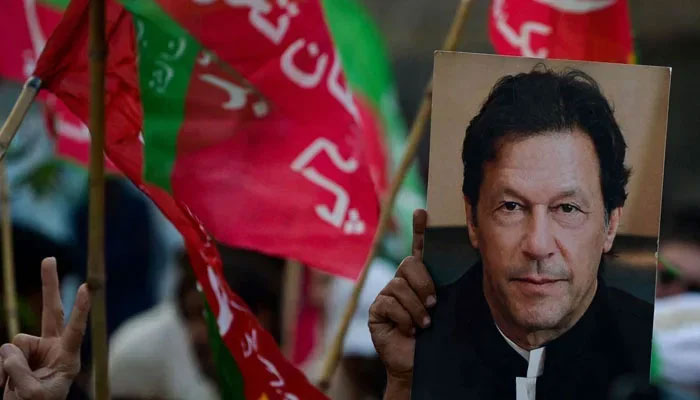Whither strategy?
If party was never seriously considering such move, why were reports allowed to circulate without immediate clarification?
The political inertia within the PTI has become increasingly conspicuous. Once a movement-driven party that promised change and disruption to status-quo politics, it now finds itself in a state of strategic confusion and political irrelevance. The recent contradictory signals emerging from the party’s top leadership only reinforce the perception that the PTI has no clear plan for its political future. First, there were murmurs about no-confidence motions against Prime Minister Shehbaz Sharif and National Assembly Speaker Ayaz Sadiq. The idea, floated in certain media circles, was swiftly denied by PTI Chairman Barrister Gohar. That denial, however, raises more questions than it answers. If the party was never seriously considering such a move, why were the reports allowed to circulate without immediate clarification? If it was a trial balloon to test political waters, it was clumsily handled and revealed more about the PTI’s internal disarray than any real strategy.
The numerical reality in parliament makes such a move not just unlikely but almost laughably impractical. Unlike the PDM’s successful maneuver in 2022, the PTI lacks the crucial support of the PPP. Recent events, including the resolution of the Cholistan canal dispute and Bilawal Bhutto-Zardari’s elevated diplomatic role, suggest a renewed strength and unity within the coalition. Any notion of the PTI replicating the opposition strategy of 2022 without the PPP’s support is simply delusional. The internal discord doesn’t stop there. Some voices within the PTI continue to call for engagement with the establishment, while explicitly rejecting dialogue with the government. This one-sided approach has failed repeatedly and reflects an enduring political immaturity. Backchannel efforts, if any, appear ad hoc and devoid of substance. More importantly, they sidestep the real issue: that the PTI needs to return to democratic norms, which include engaging political opponents directly and constructively. There have also been whispers of some kind of deal in the works for Imran Khan and the PTI, though even those in the government have deemed such speculation implausible. The reality is that street power and anti-establishment bravado no longer carry the same currency. The May 9 and November 24–26 episodes have irrevocably altered the terrain. Now is not the time for more brinkmanship or illusions of grandeur. The best course forward for the PTI is political engagement. A ‘Charter of Democracy/Economy’ signed by all major parties could help chart a new and stable political path. Such agreements would require humility, compromise, and most of all, a break from the politics of personal vendetta that has defined the PTI’s approach.
For a party that once prided itself on being different, the PTI has too often fallen into the same traps it claimed to oppose: personalism, populism and political short-sightedness. From not forming a coalition government when it had the chance, to abandoning the parliamentary platform, to refusing to engage all opposition parties, the party has squandered multiple opportunities to be a serious political force. It is time to stop waiting for external salvation – be it from the courts, the establishment, or the streets – and start acting like a political party that intends to govern. That begins with strategy and dialogue. And most importantly, that begins with letting go of the demand that politics revolve solely around the release or return of one individual. The nation cannot afford more political theatre.
-
 Katherine Schwarzenegger Shares Sweet Detail From Early Romance Days With Chris Pratt
Katherine Schwarzenegger Shares Sweet Detail From Early Romance Days With Chris Pratt -
 Jennifer Hudson Gets Candid About Kelly Clarkson Calling It Day From Her Show
Jennifer Hudson Gets Candid About Kelly Clarkson Calling It Day From Her Show -
 Princess Diana, Sarah Ferguson Intense Rivalry Laid Bare
Princess Diana, Sarah Ferguson Intense Rivalry Laid Bare -
 Shamed Andrew Was With Jeffrey Epstein Night Of Virginia Giuffre Assault
Shamed Andrew Was With Jeffrey Epstein Night Of Virginia Giuffre Assault -
 Shamed Andrew’s Finances Predicted As King ‘will Not Leave Him Alone’
Shamed Andrew’s Finances Predicted As King ‘will Not Leave Him Alone’ -
 Expert Reveals Sarah Ferguson’s Tendencies After Reckless Behavior Over Eugenie ‘comes Home To Roost’
Expert Reveals Sarah Ferguson’s Tendencies After Reckless Behavior Over Eugenie ‘comes Home To Roost’ -
 Bad Bunny Faces Major Rumour About Personal Life Ahead Of Super Bowl Performance
Bad Bunny Faces Major Rumour About Personal Life Ahead Of Super Bowl Performance -
 Sarah Ferguson’s Links To Jeffrey Epstein Get More Entangled As Expert Talks Of A Testimony Call
Sarah Ferguson’s Links To Jeffrey Epstein Get More Entangled As Expert Talks Of A Testimony Call -
 France Opens Probe Against Former Minister Lang After Epstein File Dump
France Opens Probe Against Former Minister Lang After Epstein File Dump -
 Last Part Of Lil Jon Statement On Son's Death Melts Hearts, Police Suggest Mental Health Issues
Last Part Of Lil Jon Statement On Son's Death Melts Hearts, Police Suggest Mental Health Issues -
 Leonardo DiCaprio's Girlfriend Vittoria Ceretti Given 'greatest Honor Of Her Life'
Leonardo DiCaprio's Girlfriend Vittoria Ceretti Given 'greatest Honor Of Her Life' -
 Beatrice, Eugenie’s Reaction Comes Out After Epstein Files Expose Their Personal Lives Even More
Beatrice, Eugenie’s Reaction Comes Out After Epstein Files Expose Their Personal Lives Even More -
 Will Smith Couldn't Make This Dog Part Of His Family: Here's Why
Will Smith Couldn't Make This Dog Part Of His Family: Here's Why -
 Kylie Jenner In Full Nesting Mode With Timothee Chalamet: ‘Pregnancy No Surprise Now’
Kylie Jenner In Full Nesting Mode With Timothee Chalamet: ‘Pregnancy No Surprise Now’ -
 Laura Dern Reflects On Being Rejected Due To Something She Can't Help
Laura Dern Reflects On Being Rejected Due To Something She Can't Help -
 HBO Axed Naomi Watts's 'Game Of Thrones' Sequel For This Reason
HBO Axed Naomi Watts's 'Game Of Thrones' Sequel For This Reason




